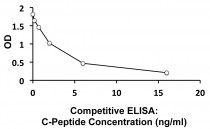ARG80782
Human C Peptide ELISA Kit
Human C Peptide ELISA Kit for ELISA and Human
Metabolism kit; Neuroscience kit; Signaling Transduction kit
Overview
| Product Description | ARG80782 Human C Peptide ELISA Kit is an enzyme immunoassay kit for the quantification of C-Peptide in serum, plasma (EDTA, heparin, citrate) and urine. |
|---|---|
| Tested Reactivity | Hu |
| Tested Application | ELISA |
| Target Name | C Peptide |
| Conjugation | HRP |
| Conjugation Note | Substrate: TMB and read at 450 nm |
| Sensitivity | 0.064 ng/ml |
| Sample Type | Serum, plasma (EDTA, heparin, citrate) and urine. |
| Standard Range | 0.2 - 16 ng/ml |
| Sample Volume | 100 µl |
| Alternate Names | IDDM; IDDM2; IDDM1; ILPR; MODY10; Insulin; IRDN |
Application Instructions
| Assay Time | 5 min, 3 h, 1 h, 30 min |
|---|
Properties
| Form | 96 well |
|---|---|
| Storage Instruction | Store the kit at 2-8°C. Keep microplate wells sealed in a dry bag with desiccants. Do not expose test reagents to heat, sun or strong light during storage and usage. Please refer to the product user manual for detail temperatures of the components. |
| Note | For laboratory research only, not for drug, diagnostic or other use. |
Bioinformation
| Database Links | |
|---|---|
| Gene Symbol | INS |
| Gene Full Name | insulin |
| Background | Insulin is synthesized in the pancreatic beta cells as a 6000 MW component of an 86 amino acid polypeptide called proinsulin. Proinsulin is subsequently cleaved enzymatically, releasing insulin into the circulation along with a residual 3000 MW fragment called connection ("C") peptide, so-named because it connects A and B chains of insulin within the proinsulin molecule. Human C-Peptide, a 31 amino acid residue peptide, has a molecular mass of approximately 3000 daltons. C-Peptide has no metabolic function. However, since C-Peptide and insulin are secreted in equimolar amounts, the immunoassay of C‑Peptide permits the quantitation of insulin secretion. This is the reason for the clinical interest of serum and urinary determinations of C-Peptide. Moreover, C-Peptide measurement has several advantages over immunoassays of insulin. The half-life of C-Peptide in the circulation is between two and five times longer than that of insulin. Therefore, C-Peptide levels are a more stable indicator of insulin secretion than the more rapidly changing levels of insulin. A very clear practical advantage of C-Peptide measurement arising from its relative metabolic inertness as compared to insulin is that C-Peptide levels in peripheral venous blood are about 5-6 times greater than insulin levels. Also, relative to an insulin assay, the C-Peptide assay's advantage is its ability to distinguish endogenous from injected insulin. Thus, low C-Peptide levels are to be expected when insulin is diminished (as in insulin-dependent diabetes) or suppressed (as a normal response to exogenous insulin), whereas elevated C-Peptide levels may result from the increased β-cell activity observed in insulinomas. C-Peptide has also been measured as an additional means for evaluating glucose tolerance and glibenclamide glucose tests. C-Peptide levels are in many ways a better measurement of endogenous insulin secretion than peripheral insulin levels. C-Peptide may be measured in either blood or urine. With improved sensitive C-Peptide immunoassays, it is now possible to measure C-Peptide values at extremely low levels. The clinical indications for C-Peptide measurement include diagnosis of insulinoma and differentation from factitious hypoglycemia, follow-up of pancreatectomy, and evaluation of viability of islet cell transplants. Recently, these indications have been dramatically expanded to permit evaluation of insulin dependence in maturity onset diabetes mellitus. Clinical Indications for the C-Peptide ELISA - Assessment of residual ß-cell function in diabetics under insulin therapy - Detection and monitoring of the remission phase of type I diabetes - Adjunct in the differential diagnosis between type I (insulin dependent) and type II (non-insulin-dependent) diabetes - Diagnosis of insulin-induced factitious hypoglycemia. - Contribution to the diagnosis of insulinoma (insulin suppression test) - Prognostic index of fetal outcome in pregnant diabetic women - Evaluation of insulin secretion in liver disease - Monitoring of pancreasectomy |
| Highlight | Related products: C Peptide antibodies; C Peptide ELISA Kits; New ELISA data calculation tool: Simplify the ELISA analysis by GainData |
| Research Area | Metabolism kit; Neuroscience kit; Signaling Transduction kit |
Images (1) Click the Picture to Zoom In
-
ARG80782 Human C Peptide ELISA Kit standard curve example image
The representative standard curve of ARG80782 Human C Peptide ELISA Kit. The standard curve is for demonstration only and cannot be used in place of data generations at the time of assay. The standard curve should be generated each time the assay is performed.
| Title | Download Link |
|---|---|
| ARG80782 Human C Peptide ELISA Kit User's manual |
 Download Download
|






